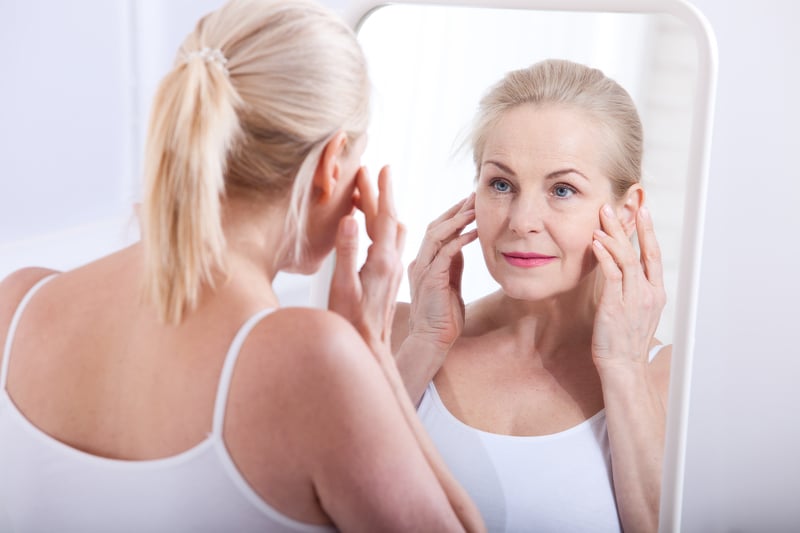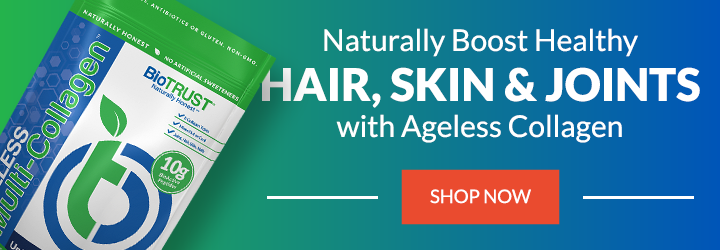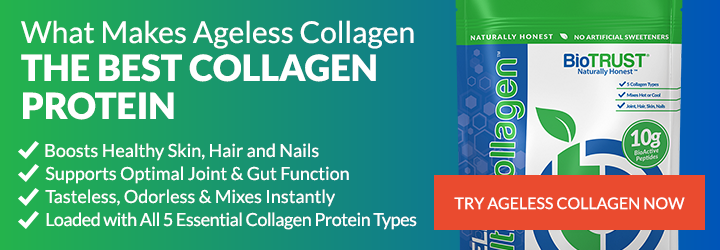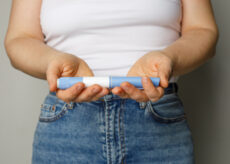How to Protect Your Body from Collagen Loss

There’s one compound in our bodies that holds us together like glue. It makes up 70% 80% of the protein in the skin (and 30% of the protein in the body). What is it? Collagen.
Collagen loss is the top cause of aging skin. What causes collagen loss in the body? And more importantly, how can we support collagen levels?
In today’s article about collagen loss, we will cover:
- What is Collagen?
- What Causes Collagen Loss?
- How to Protect Against Collagen Loss?
- Preventing Collagen Loss
What is Collagen?
Before we can start answering those questions, let’s look at what collagen is. In short, collagen is the most common protein in the body. It’s found in muscles, bones, tendons, and blood vessels. It’s also a key component of the digestive system.
However, when most people think about collagen loss, they are specifically thinking about collagen and its importance in skin health and aging. You see, collagen is what makes our skin look plump, hydrated, and youthful. When we’re young, collagen fibers are strong and plentiful, leading the skin to look soft and smooth. If you pinch your cheek when you’re young, it even feels full and almost spongy.
Yet, as we age, we naturally produce less collagen. This interferes with the body’s ability to break down old, damaged collagen to be replaced with new, younger, healthier collagen. And as levels of collagen decrease, the common signs of aging become more apparent. Signs like wrinkles, sagging skin, and stiff and painful joints.
Additional signs of collagen loss include:
- Stiffer tendons and ligaments
- Decreased flexibility
- Decreased muscle mass
- Decreased strength
- Joint pain
- Digestive problems
What Causes Collagen Loss?
1. Age
As we age, collagen production naturally declines by about 1% each year, starting from the late teens or early 20s. 1 And by the age of 35, the collagen-making machinery of our cells can really begin to decline.
Aging is inevitable…we’re all getting older. So, as we age, it’s even more important to help reduce collagen loss. Keeping collagen levels higher can help the skin stay soft, smooth, elastic, hydrated, and firm, and it can also help the skin renew and repair.
2. Sun Damage
While we need sun exposure to create vitamin D, improve sleep, reduce stress, lift mood, strengthen the immune system, and much more, too much sun exposure can lead to damage from ultraviolet (UV) light. Research confirms that UV overexposure can damage collagen, accelerating skin aging and wrinkles. 2
3. Smoking
Smoking leads to premature aging and looking much older than you are, and much of this is because smoking damages collagen. Smoking also lowers levels of oxygen delivered to cells, including skin cells, so they’re unable to regenerate. Folks who smoke have more, deeper wrinkles, including crow’s feet, facial lines, undereye bags, upper lip wrinkles, and jowls, than folks who don’t. 3
4. Inflammatory Diets
Meal plans rich in sugar, and other simple carbohydrates, processed meats, and refined oils, can increase inflammation throughout the body. The increased inflammation can then slow wound healing and skin regeneration. High sugar consumption can be especially damaging for collagen and skin repair, leading to premature aging of the skin. A high-sugar diet combined with overexposure to UV light can lead to even more damage. 4
5. Chronic Stress
Stress has both positive and negative effects on the body, but when stress tips over to being chronic or overwhelming, it can lead to increased levels of cortisol as well as increased inflammation in the body. This imbalance can then affect collagen levels as less collagen is produced when the body is stressed. 5,6
6. Environmental Factors
Skin is always in the process of being created or destroyed. Some factors can help with the creation (e.g., healthy diet and proper hydration), while others increase the destruction. Harsh weather, including extreme heat, cold, and wind, as well as pollution, dust, and allergens. can lead to skin damage. 7,8 Pollution, in fact, may be the skin’s biggest enemy, leading to wrinkles as well as sunspots.
7. Obesity and Massive Weight Loss
Patients who have lost significant weight after bariatric surgery have been found to lack sufficient collagen fibers, which leads to lax, soft skin in the abdominal area. 9
How to Protect Against Collagen Loss?
Some collagen loss is inevitable as you age and make your way through the world. But that doesn’t mean you can’t take control to slow or even prevent collagen loss. Here are eight things you can do to help naturally support collagen levels.
1. Consume Collagen
High-quality collagen supplements like Ageless Multi-Collagen Protein Powder™ may provide nutrients needed to promote collagen levels and improve skin elasticity and hydration. 10,11
On the other hand, while skincare products with added collagen are common, they likely aren’t very effective. Collagen can’t cross through the layers of the skin, so collagen creams are likely just a waste of money. Instead, ensure you consume, rather than apply, your collagen.
2. Consume Antioxidants
To fight free radical damage, including collagen loss, the body needs plenty of antioxidants like vitamin C. 12 Vitamin C has been shown in research to support the production and stability of collagen. 13 Since the body is unable to make vitamin C, it must be obtained from the diet, so ensure you are getting a rainbow of vegetables and fruits like oranges, peppers, strawberries, broccoli, potatoes, and Brussels sprouts. You can also get vitamin C as a supplement or as part of skincare products.
Other foods, drinks, and spices rich in a variety of antioxidants include blueberries, green tea, yerba mate, coffee, cinnamon, basil, and oregano.
3. Consume Hyaluronic Acid
Foods rich in amino acids, like beans, root vegetables, and soy, provide hyaluronic acid, which is important for supporting collagen in the skin. Hyaluronic acid can also be found in numerous beauty products to apply to the skin.
4. Exercise Regularly
Anything that increases blood supply and boosts oxygenation helps the skin look younger and healthier. Bottom line–make sure you’re getting exercise regularly to boost circulation.
5. Wear Sunscreen
While some sun exposure is helpful to ensure you get enough vitamin D, if you are going to spend some extra time in the sun, it’s time to add sunscreen to the equation. To protect the delicate skin on the face and around the eyes, a daily facial sunscreen, as well as sunglasses on bright days, can also help protect the skin from collagen loss.
While there is some debate on sunscreens (and some sunscreens are far from healthy), research found that a mere two hours of sun spread out over two days is enough to increase the production of MMP1, a collagen-degrading enzyme, in folks with fair skin. 14 Additional exposure then leads to greater damage. Other research has found that when fair-skinned folks used sunscreen three to four times a week, their skin showed no signs of aging even after four and half years. 15 Their smoother, younger skin indicated reduced collagen loss.
6. Add Aloe Vera
Many folks only use aloe vera products after too much sun exposure, as evident by a sunburn, or to help relieve other burns, rashes, or wounds. 16 However, research is now showing the aloe may be used to support skin health before damage is revealed. Daily use has been shown to help stimulate collagen levels as well as increase hyaluronic acid production. 17 Aloe vera can be used topically or taken orally as a supplement.
7. Keep Skin Clean
One of the best ways to battle environmental impacts on skin is to keep the skin clean. Wash daily and exfoliate regularly (no more than a few times per week) to help protect collagen in the skin.
8. Try Red Light Therapy
Many skin treatments like microdermabrasion, chemical peels, and resurfacing procedures, can lead to complications and take a long while to recover from. Alternatively, using red light therapy may help increase levels of collagen in the skin, decrease the appearance of wrinkles, and improve skin elasticity. Better yet, the recovery time is quick, easy, and safe as it’s non-invasive. 18 While you can get red-light treatments at spas, home devices are also readily available.
Preventing Collagen Loss
No matter how young or how old you are, the time to start ensuring you are protecting against collagen loss is now. It’s even better when you’re young, before the damage has become apparent. That is, it’s harder to correct the collagen loss once the skin is already starting to show signs of sagging, thinning, and wrinkling. That said, it’s also never too late to incorporate healthy collagen-boosting habits into your life.






 7 Signs Your Body is Seriously Low on Collagen (not just wrinkles)
7 Signs Your Body is Seriously Low on Collagen (not just wrinkles) Health Expert: "Turmeric Doesn't Work (unless...)"
Health Expert: "Turmeric Doesn't Work (unless...)" 3 Warning Signs Your Probiotic Supplement is a Total Waste
3 Warning Signs Your Probiotic Supplement is a Total Waste

